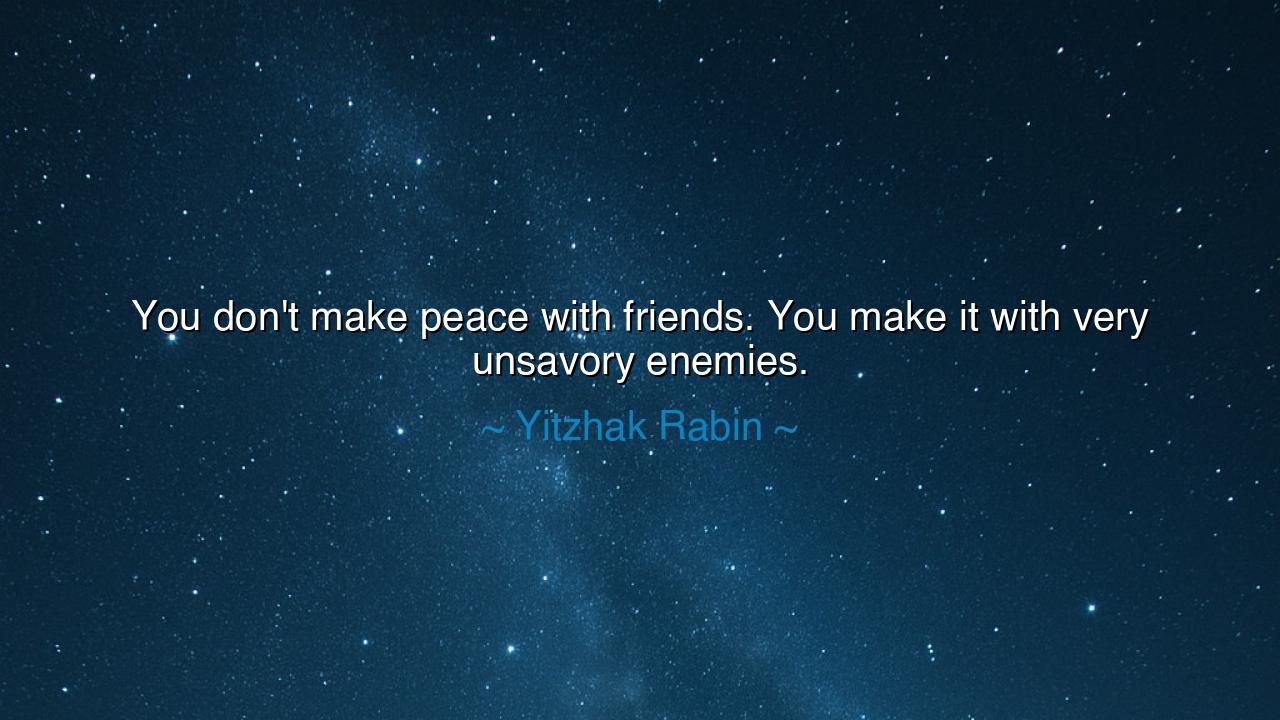
You don't make peace with friends. You make it with very






"You don't make peace with friends. You make it with very unsavory enemies." Thus declared Yitzhak Rabin, a soldier, a statesman, and a man who bore the weight of war and the burden of reconciliation. His words cut deep into the heart of human struggle, for they remind us that true peace is not forged in the warmth of fellowship, but in the hard fires of conflict. Friends need no treaties, for friendship already binds them. It is with the foe—hated, mistrusted, despised—that the bridge must be built, if the sword is ever to be laid down.
The ancients themselves knew this truth. Did not the Athenians, weary of endless battles with Sparta, sign treaties with the very city that had slain their brothers? Did not Rome, after years of bloodshed with Carthage, eventually learn to build peace across the ruins, acknowledging that no war could last forever? In every age, the courage required to make peace with an enemy has been greater than the courage required to fight him. For war springs from anger, but peace requires humility, patience, and vision.
Rabin himself bore this lesson in his flesh. As Israel’s prime minister, he had fought wars against those who surrounded his people. Yet when the time came, he sat with those same adversaries—men whom many called "unsavory," men whose hands had been raised against his nation. At Oslo, with trembling hearts and steady resolve, he clasped hands with Yasser Arafat. It was not the clasp of friendship, but the clasp of necessity, of hope that tomorrow’s children might know fields of harvest instead of battlefields of blood.
History gives us other examples. Think of Abraham Lincoln, who, in the aftermath of the Civil War, spoke not of vengeance but of healing: "With malice toward none, with charity for all." He knew that only by reconciling with the vanquished could the United States endure. Or consider Nelson Mandela, who after 27 years in prison extended forgiveness to his jailers and enemies. He did not make peace with those who already loved him, but with those who had sought his destruction. And in doing so, he transformed the soul of a nation.
Children of tomorrow, mark this well: it is easy to embrace a friend, but it is divine to embrace a foe. To cling to hatred is to remain bound by war, but to offer the hand of peace is to break the chain. This does not mean blindness to evil, nor surrender to injustice, but the recognition that only reconciliation can end the cycle of blood and revenge. Without it, the sword never rests, and the grave never ceases to fill.
Practical wisdom lies here: seek reconciliation where bitterness festers. In your own life, you will meet those who wrong you, those whose words wound, whose actions betray. Do not think that peace will come from ignoring them or retreating into the circle of your friends. If you would be free, you must face them. Speak, forgive where you can, and build what bridges may be built. Even if they are "unsavory," even if they remain difficult, the effort itself breaks the hold of hatred over your own heart.
Thus the lesson is clear: true peace is not the easy work of friendship, but the hard labor of reconciliation. Rabin’s words echo like a command across the ages: if you would end war, you must speak to your enemy. If you would heal the world, you must walk the path of humility and courage. Do this, and you will find that even the bitterest foe can become the cornerstone of a lasting peace.






AAdministratorAdministrator
Welcome, honored guests. Please leave a comment, we will respond soon